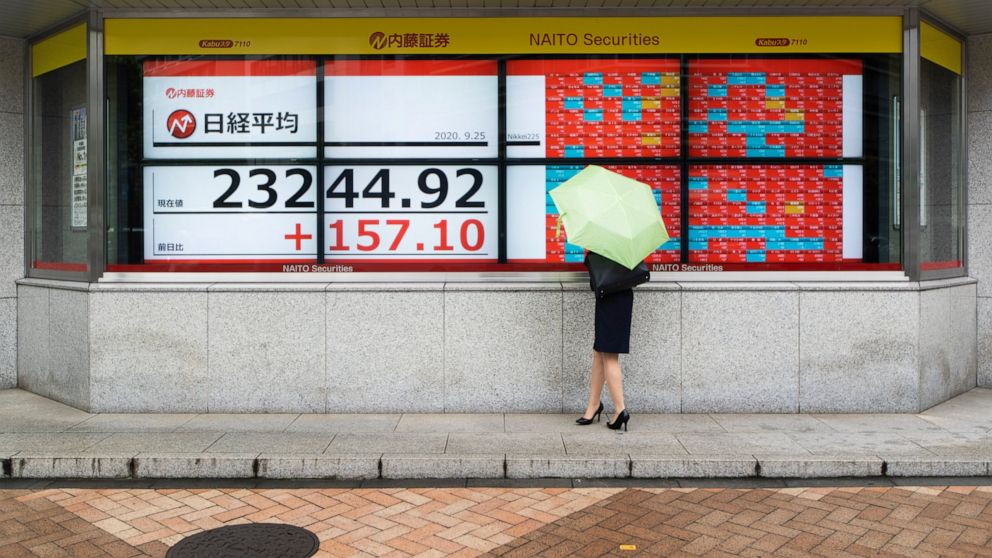Wall Street yo-yos as S&P 500 heads for 4th weekly loss
U.S. stocks are wobbling Friday morning, as the S&P 500 heads for a fourth straight week of losses amid Wall Street’s sudden September swoon
NEW YORK — U.S. stocks are wobbling Friday morning, as the S&P 500 heads for a fourth straight week of losses amid Wall Street’s sudden September swoon.
The S&P 500 was 0.1% higher after flip-flopping between small gains and losses a few times after trading opened. Stocks have been erratic recently, and indexes have taken several sharp turns in momentum each day. The S&P 500 is still on pace for a loss of 2.1% this week, which would give the index its first four-week losing streak in more than a year.
The Dow Jones Industrial Average was down 11 points, or less than 0.1%, at 26,803, as of 10:26 a.m. Eastern time, and the Nasdaq composite was 0.6% higher.
Smaller stocks were faring slightly better, and the Russell 2000 index of small-cap stocks was 0.9% higher.
Stocks have struggled this month amid a long list of concerns. Chief among them is that stocks may have gotten too expensive following their record-breaking run through the summer, after storming 60% higher. Critics say Big Tech stocks in particular rose too high, even after accounting for their tremendous growth despite the economy’s struggles with the pandemic.
Big Tech stocks were mixed in early Friday trading. Apple was up 1.5%. Microsoft rose 0.8%, but only after flitting between gains and losses. Google’s parent company was down 0.3%.
Recently, investors’ frustration has also grown with the inability of Congress to deliver more aid to the economy after weekly unemployment benefits and other stimulus expired.
Democrats in the House of Representatives are paring back their proposal for stimulus in hopes of jumpstarting talks with the White House, but investors are skeptical something can happen soon. Deep partisan divisions have kept Congress from acting, and tensions are on the rise due to the sudden vacancy on the Supreme Court following the death of Justice Ruth Bade Ginsburg.
President Donald Trump has also declined to guarantee a peaceful transfer of power if he loses the upcoming election, though other Republicans have pushed back on that idea.
“This stimulus deal needs to go through,” Stephen Innes of AxiCorp said in a commentary. “With the risks building up everywhere you look, it doesn’t seem to be a great time to be trying to pick the bottom of equity markets, but a stimulus relief bill will go a long way to nudging the market along.”
Yet another report on Friday suggested that the economy’s recovery is slowing without the support from Capitol Hill. Growth for U.S. orders of machinery and other long-lasting goods was just 0.4% last month, down from 11.7% in July. The figure on durable goods was much weaker than economists had forecast, though several said they saw a mixed picture underneath the headline numbers.
Among other concerns for markets are rising tensions between the United States and China and the possibility that investors’ expectations for a COVID-19 vaccine arriving early next year may prove to be too optimistic.
Novavax rose 10.8% after it said it began a late stage trial of its potential COVID-19 vaccine in the United Kingdom.
On top of all the market’s concerns are the pandemic and worries that worsening trends could lead to more profit-choking restrictions on businesses.
All those concerns have helped push the S&P 500 down more than 7% this month, following up on five straight months of strong gains.
Investors pulled $22.8 billion out of stock funds in the week ending Sept. 23, the largest outflow since March, according to a BofA Global Research report.
Wall Street’s rally started in late March after the Federal Reserve and Congress pledged massive amounts of support for the economy. Budding economic improvements later in the spring helped accelerate the gains as widespread shutdown orders lifted.
The Fed has pledged to continue to hold short-term rates at nearly zero for years, but its chair Jerome Powell said repeatedly in testimony on Capitol Hill this week that the recovery will likely need more help from Congress as well.
In Europe, stocks were also weakening. Germany’s DAX lost 1.9%, and France’s CAC 40 fell 1.4%. The FTSE 100 in London fell 0.3%.
In Asia, Japan’s Nikkei 225 rose 0.5% and South Korea’s Kospi added 0.3%. Hong Kong’s Hang Seng fell 0.3%, and stocks in Shanghai slipped 0.1%.
The yield on the 10-year Treasury dipped to 0.65% from 0.66% late Thursday.
———
AP Business Writer Yuri Kageyama contributed.
![]()


